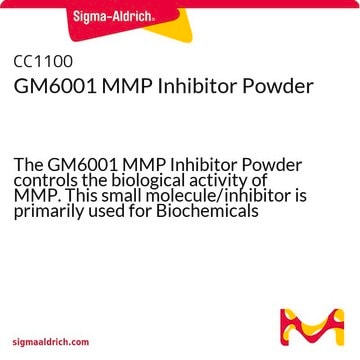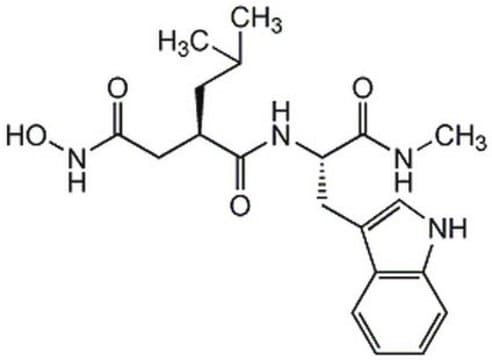PZ0198
Prinomastat hydrochloride
≥95% (HPLC)
Synonyme(s) :
(S)-2,2-Dimethyl-4-((p-(4-pyridyloxy)phenyl)sulfonyl)-3-thiomorpholinecarbohydroxamic acid hydrochloride, AG 3340 hydrochloride, AG-3340 hydrochloride, AG3340 hydrochloride
About This Item
Produits recommandés
Niveau de qualité
Pureté
≥95% (HPLC)
Forme
powder
Conditions de stockage
desiccated
Couleur
white to beige
Solubilité
H2O: 15 mg/mL (clear solution)
Température de stockage
room temp
Chaîne SMILES
Cl.CC1(C)SCCN([C@H]1C(=O)NO)S(=O)(=O)c2ccc(Oc3ccncc3)cc2
InChI
1S/C18H21N3O5S2.ClH/c1-18(2)16(17(22)20-23)21(11-12-27-18)28(24,25)15-5-3-13(4-6-15)26-14-7-9-19-10-8-14;/h3-10,16,23H,11-12H2,1-2H3,(H,20,22);1H/t16-;/m0./s1
Clé InChI
UQGWXXLNXBRNBU-NTISSMGPSA-N
Description générale
Application
Actions biochimiques/physiologiques
Mention d'avertissement
Danger
Mentions de danger
Conseils de prudence
Classification des risques
Repr. 1B
Code de la classe de stockage
6.1C - Combustible acute toxic Cat.3 / toxic compounds or compounds which causing chronic effects
Classe de danger pour l'eau (WGK)
WGK 3
Point d'éclair (°F)
Not applicable
Point d'éclair (°C)
Not applicable
Certificats d'analyse (COA)
Recherchez un Certificats d'analyse (COA) en saisissant le numéro de lot du produit. Les numéros de lot figurent sur l'étiquette du produit après les mots "Lot" ou "Batch".
Déjà en possession de ce produit ?
Retrouvez la documentation relative aux produits que vous avez récemment achetés dans la Bibliothèque de documents.
Notre équipe de scientifiques dispose d'une expérience dans tous les secteurs de la recherche, notamment en sciences de la vie, science des matériaux, synthèse chimique, chromatographie, analyse et dans de nombreux autres domaines..
Contacter notre Service technique








